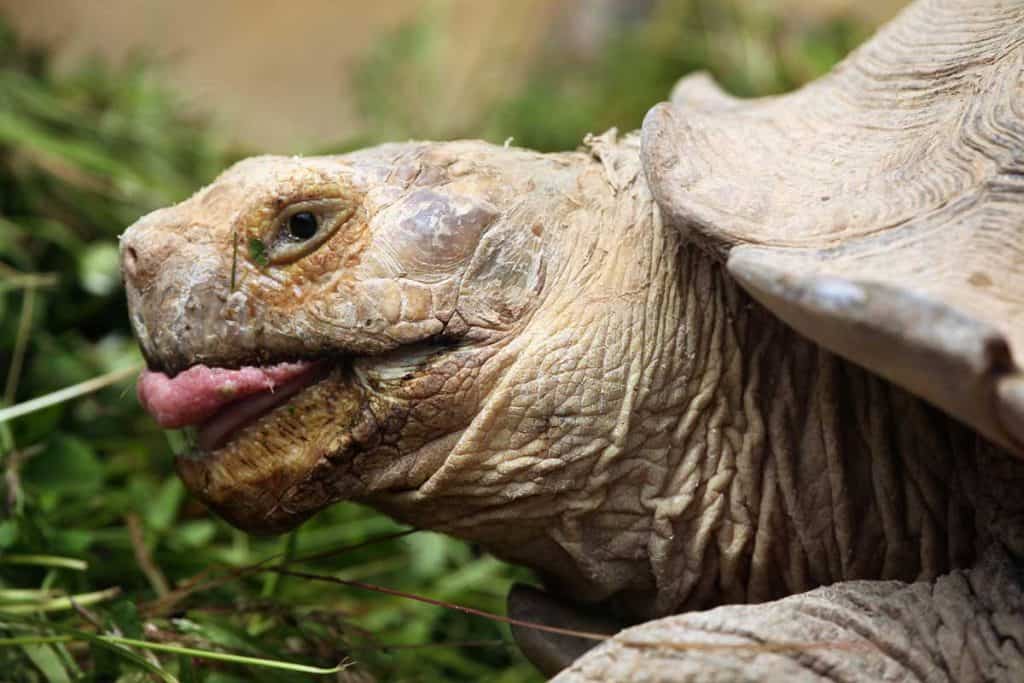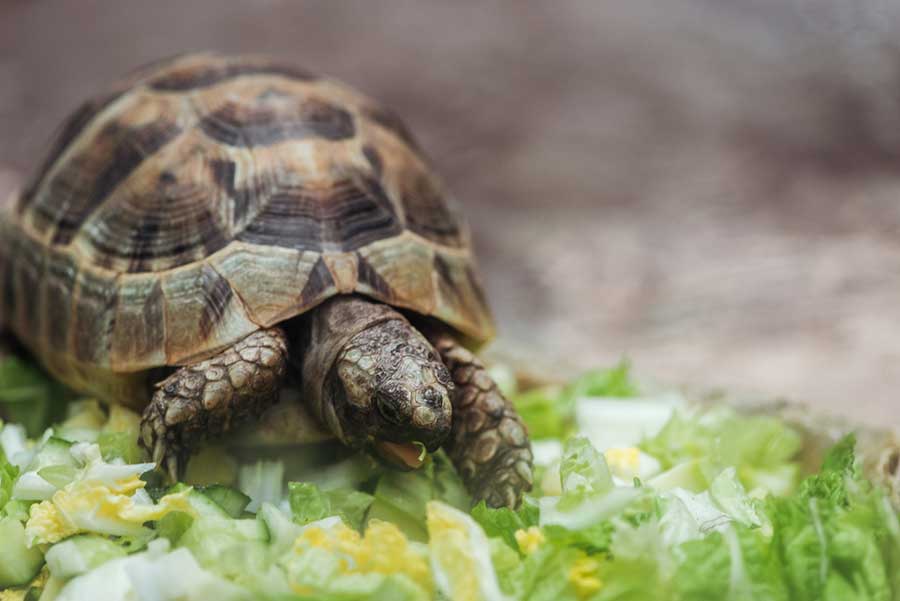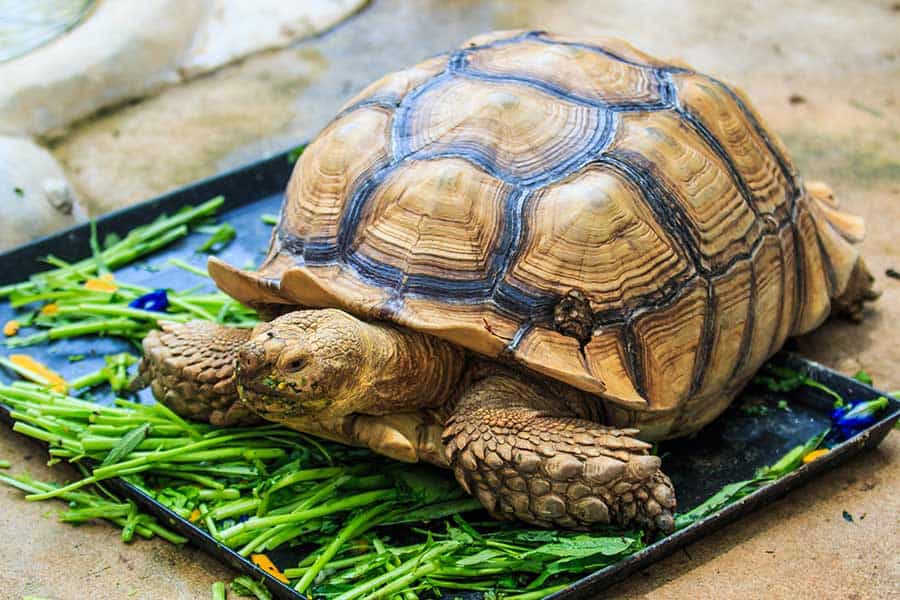Tortoises eat a wide variety of foods in the wild. If you have ever watched a tortoise eat, it looks like they chomp everything in sight! This might make you wonder: what do tortoises eat?
These unique reptiles are mostly herbivorous with the exception of a few tortoise species who will actively eat insects or carrion if they come across it. This means most tortoises can be fed a purely vegetarian diet; however, if your tort is not a strict herbivore, you can offer an occasional earthworm.
Tortoises also eat on an interesting schedule. Most species will eat for around five days and then take a fasting break for about two days to allow their digestive systems to fully process their food and avoid developing impaction or other digestive issues.
Knowing how much to feed your tortoise is a breeze! This is because they come with their own measuring cups. You can refer to your tort’s shell and head size as indicators for portion size!
Feeding your tortoise a healthy diet can extend its lifespan, keep it healthy, and make sure it is comfortable and living its best life! Read on to learn more.
What Do Tortoises Eat and What Should You Feed Them?
Your tortoise will need a variety of food in its diet to maintain proper nutrition and to keep it interested in its food.
A herbivorous tortoise’s diet should follow the following ratio: 80:20
To clarify, this simply means 80% of your tortoise’s diet should be made up of vegetables and greens, and 10% to 20% should be fruit. However, 10% of that fruit portion can be made up of flowers, as they are yummy but do not hold much nutritional value.
By comparison, an omnivorous tortoise’s diet is slightly different. It should follow the following ratio: 50:10:40.
This means 50% of your tortoise’s diet should be made up of greens and vegetables, 10% should be made up of fruits, and 40% should be made up of insect-based protein.
Vegetables and Greens
Safe vegetables and greens for tortoises include:
- Mustard greens
- Collard greens
- Dark leaf lettuces
- Kale
- Beet tops
- Yellow squash
- Orange squash
- Carrots
- Sweet potatoes
- Mulberry leaves
- Red and yellow bell peppers
- Escarole
- Endive
- Clover
Always wash your vegetables and leaves before you give them to your tortoise. This is because many of them are treated with herbicides and pesticides that can cause your tortoise serious harm.
You should also avoid greens that are very high in phosphorus, as this decreases your tortoise’s ability to absorb
Avocado, onion, and chives should be avoided, too. These are all toxic to reptiles and will cause serious harm to your tortoise.
Another important thing to note is that iceberg lettuce, other light lettuces, cucumber, and celery are nutritionally devoid foods. This is because they contain mostly water and cellulose and very little else, so they aren’t beneficial for your tortoise’s health.
Fruits
Adding fruits to your tortoise’s meals adds some flavor and vitamin variation. However, fruits should be strictly limited, as they contain a lot of sugar, which can lead to obesity and gum rot.
Safe fruits include:
- Watermelon
- Sweet melon
- Blackberries
- Blueberries
- Strawberries
- Mulberries
- Banana
- Mango
- Papaya
- Peaches
- Plums
All citrus fruits should be avoided, as they are very high in citric acid. This acid can potentially burn your tortoise’s mouth and digestive system.
Always remember to remove any seeds, pips, stones, or pits from any fruits before giving them to your tortoise.
Flowers and Herbs
Flowers and herbs are mostly nutritionally devoid. However, they are bright, interesting, smell good, and taste yummy, which all mentally stimulates your tortoise during food time. Many herbs and flowers can make excellent supplemental snacks for your tort’s diet.
Safe flowers and herbs include:
- Hibiscus
- Lavender
- Dandelions
- Lemon balm
- Geranium
- Rose petals
- Lilacs
- Pansies
All flowers that have bulbs like lilies and tulips are toxic to tortoises. Additionally, any flower that has a known toxicity to humans should not be eaten by tortoises. If you are unsure of any flowers’ toxicity or their nutritional value, always research them thoroughly before you feed them to your tortoise.
Protein
Omnivorous tortoises need protein in their diets. The protein should be specifically for them and not from your table. Giving tortoises cooked chicken or meat leftovers, for instance, can cause them serious health problems.
Insects are generally the best source of protein for tortoises, though there are a few other notable options like eggs and mice depending on your tortoise’s size and species.
Safe insect protein options include:
- Earthworms
- Hornworms
- Black soldier fly larvae (also known as Phoenix worms or NutriGrubs)
- Mealworms
- Dubia roaches
Check out our wormy breakdown to decide what worms are right for your tortoise based on their nutritional content.
Some good non-insect protein sources for tortoises include:
- Small pinkies (baby mice)
- Pieces of chicken
- Eggs
- Liver
- Giblets
Non-insect animal protein like mice or chicken should never be fed live to your tortoise. They should always be frozen and then thawed. This is far more humane and responsible, as it prevents the animal from hurting your tortoise and also kills off bacteria and any nasty parasites that may be living in the meat.
Supplements
All tortoises, regardless of their diet, should receive a
The powder will provide them with enough
Pre-Packaged/Commercial Tortoise Food
Pre-packaged tortoise food such as this one from Mazuri or this grassland tortoise food from Zoo Med can be added to your tortoise’s daily salad to ensure they get all of their nutrients. Having this on hand can also help if you run out of fresh food and are not sure what to supplement your tortoise’s diet with.
Keep in mind that these commercial foods like these are best used as supplements rather than staple foods. The bulk of your tortoise’s diet should be fresh vegetables, greens, fruits, and flowers.
How Often Should You Feed Your Tortoise?
Different types of animals require different feeding schedules. For example, humans eat three to five meals a day, while most snakes eat one meal every week or two. How often do tortoises need to eat, then?
In general, tortoises should be fed a single meal once a day for five days of the week. They should then take a two-day break. This two-day break is for their digestive systems to catch up with and process their large meals.
The two-day ‘fast’ is an important opportunity for your tortoise to empty its digestive system fully. These days are also crucial for you, as an owner, to check on your tortoise’s health via their poop!
Runny poops can indicate that your tortoise has a parasite infestation or is not getting the right diet. Alternatively, if your tortoise is not pooping at all, then they could be seriously dehydrated and probably need an extra long soaking bath or an increase in the humidity in their enclosure.
How Much Should You Feed Your Tortoise?
Your tortoise comes with its own measuring system! Their daily plate should be the same size as their shell!
Chop up their food to be roughly the same size as their head or smaller, and then simply fill their plate with a healthy mixture of the foods we went over earlier. Any fruit or protein items added to your tortoise’s plate should also be around this same size. Fruits should be given one to two times a week, and the portion should not exceed the size of your tortoise’s head.
FAQs About Feeding Tortoises
What do tortoises eat in the wild?
Tortoises eat many kinds of grasses, succulents, vegetables, mushrooms, fungi, insects, flowers, fruit, and even occasionally carrion that they find in the wild.
Many of the things they eat in the wild can be found in your local grocer or online. It is always best to mimic their natural diet as closely as possible.
How do tortoises find their food?
Tortoises have surprisingly good eyesight! They can spot their food from a long distance away. They will then move slowly towards it!
Tortoises can also smell their food. This is particularly helpful if there is a dead animal nearby and they are in the mood for some carrion!
Can I feed my tortoise cat or dog food?
If your tortoise gets into the food left in your dog or cat’s
Dog and cat food is also incredibly fatty and very high in protein. This is not ideal for your tortoise’s diet and can lead to obesity and other health problems.
My tortoise is eating my grass! Is that okay?
Tortoises can eat most lawn grasses without a problem. They are grazers in the wild and are programmed to munch on the move.
Check your garden for any toxic flowers, plants, or grasses before letting your tortoise loose. However, do not worry about them chomping down on your lawn, they are just doing what is natural. Just be sure not to apply any harmful pesticides or herbicides to any areas of your lawn where your tort typically grazes!
Slowly Strolling Off…
Tortoises are amazing pets to own. However, they are not all that common, and so many new owners are left wondering: what do tortoises eat?
The long and short of it is that tortoises need lots of vegetables high in
calcium and fiber and low in phosphorus, some fruit and flowers to keep things interesting, a bit of insect or animal protein if they are omnivorous (always research on the best food for the tortoise species that you have), and a healthycalcium supplement!
Remember that variety is key, and it keeps things interesting. After all, tortoises can live for over 100 years; you wouldn’t want to eat the same meal for that long, and neither will your tortoise!
Good luck with feeding your scaly friend!




